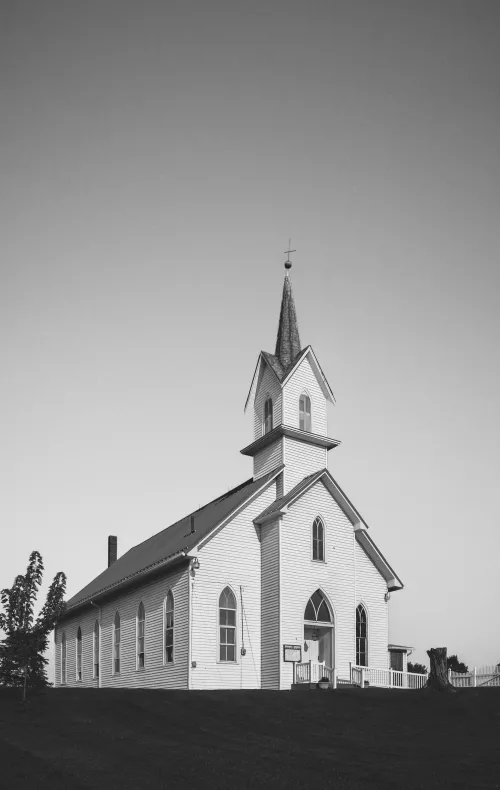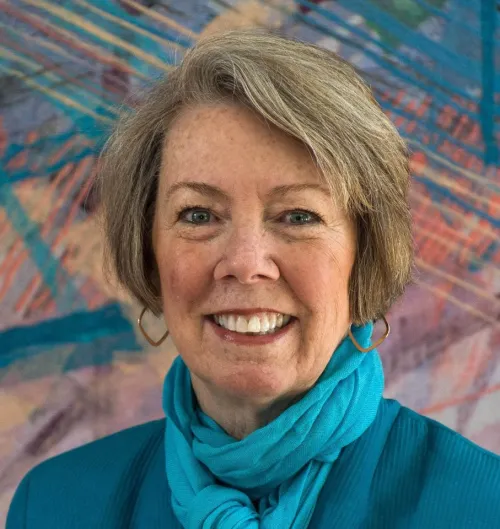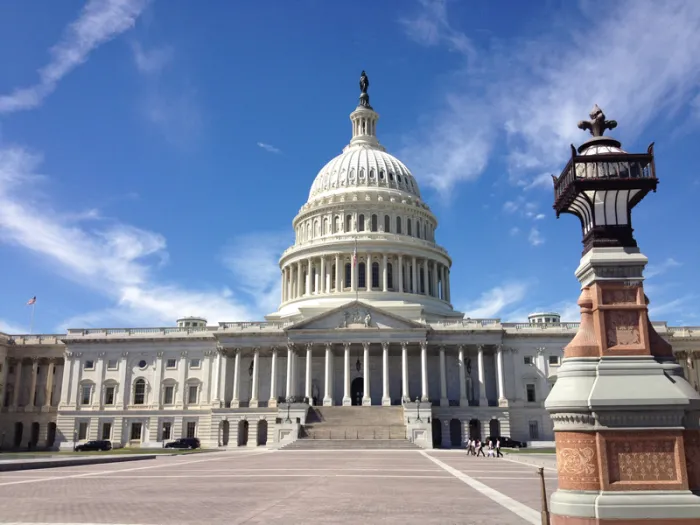Researchers study how congregations are working to prevent gun violence
Many have hired security firms or trained teams to help people feel safe during worship

LOUISVILLE — Together with Dr. David Yamane of Wake Forest University, the Rev. Dr. Katie Day, a PC(USA) pastor, author and retired seminary professor, has been studying how faith communities have worked to protect themselves following mass shootings in places of worship, including at Emmanuel AME Church in Charleston, South Carolina in 2015 and the Tree of Life Synagogue in Pittsburgh in 2018.
Day shared some of the research during a “Gun Violence and Christian Ethics” webinar put on last week by the PC(USA)’s Office of Public Witness. More than 50 people attended.
Dr. Andrew Peterson, OPW’s Associate for Peacemaking, welcomed those in attendance and noted the webinar is the second in a series of at least four exploring the intersection of gun violence and Christian ethics. Commissioners to the 225th General Assembly (2022) approved an item identifying 2022-2032 as the Decade to End Gun Violence.
Day, the Charles A. Scheiren Professor Emerita of Church in Society at United Lutheran Seminary in Philadelphia, noted household gun ownership was up 29% from 1994 to 2023, with at least one gun in nearly half of U.S. homes. From 2019, the year before the Covid pandemic began, until 2023, about 7.5 million Americans became gun owners, and a survey found that about half of non-gun owners can see themselves owning a gun in the future. About half of those surveyed said they believe guns make them safer. “The irony is more guns do not make us safer,” Day said. “If they did, we’d be the safest place on Earth.”
In 2023, 45,000 Americans died by guns, 2/3 by suicide. “These are not just numbers,” Day said. “They are human beings, loved by God.”

The 225th General Assembly approved a limited fund to help PC(USA) congregations, mid councils, worshiping communities and institutions conduct events to combat gun violence. “Trigger: The Ripple Effect of Gun Violence” has a study guide; the documentary itself is set for an update scheduled for next year.
“Faith leaders have had to contemplate this rare but horrific possibility of an active shooter in our houses of worship. It’s not covered in our seminary curricula,” Day said. “Into this vacuum, church security training organizations began to proliferate. Faith leaders have been flocking to them.”
How are congregations making sense of safety and security — theologically and practically — in light of the heightened sense of the threat of gun violence? Day and Yamane were awarded a grant from the Louisville Institute to study how congregations are conceptualizing safety and security.
They conducted research, embedded in several places, participated in national training programs for church security teams, and interviewed clergy and other church leaders in Texas, Philadelphia and North Carolina. “Our study revealed a variety of responses,” Day said. The range of responses ran from flight to fight.
“We found churches who were not concerned. Violence in their sanctuaries was incomprehensible,” Day said. For these churches, the worship space “is a refuge from the world out there. There’s no real theological framework for engaging this changing reality.”
Others told researchers, “We rely on God’s protection.” One pastor told them, “Guns may keep you safe, but only God will save you.”
Some churches said arming was incompatible with following Christ or rabbinic teaching. “Some said locking our church doors [during worship] is incompatible with our sense of hospitality,” Day said.
Many churches have enhanced their security systems. Now more than 40% of faith communities have security cameras, electronic door locks, automatic lighting or alarm systems. “This is expensive technology,” Day said, “and a problem for smaller congregations,” many of which worship in older buildings.
Some houses of worship have undergone active shooter training — by local law enforcement, retired military folks or by church security companies. “It gives people a sense of agency,” Day said. A group of churches studied have encouraged members to carry concealed weapons during worship. Day said she interviewed a ruling elder at a large, affluent church who carried a gun every day, including to worship. She asked him: How many people in the congregation are carrying? Are there others? He told her, “God, I hope so.”
The Faith Communities Today report found that concern for safety and security dropped off during the pandemic, Day said. One church member said, “We are more afraid of the virus than of a bad guy.” Many had used their time out of the building to put in new security systems, “so when they returned, they felt safer,” Day said. Another reason some people felt safer was that “many more people in church were carrying,” Days said. “There was a noticeable increase in the comfort level of carrying weapons during worship.”
Day visited a church in Philadelphia in 2019 and again in 2022, when the Board of Trustees’ chair told her, “There’s no one carrying in our church. If there is, I want to hear about it.”
Two elders told him, “We need to talk.”
“We used to welcome the stranger,” Day said. “Now there has been a subtle shift to protecting ourselves from the stranger who would do us harm.”

“I would argue that we can’t wrap our heads around security, and so we focus on safety and on guns as a means for assuring security,” Day said. She wonders: Are we sliding into a fortress mentality? Does the presence of guns undermine our trust with newcomers and pew mates? Is the church different from the culture in which we live? What does security mean to us?
A touchstone for Day has always been Dietrich Bonhoeffer, the German Lutheran pastor, theologian and anti-Nazi dissident who was put to death on April 9, 1945, exactly a month before Germany formally surrendered to the Allies. Woven throughout his lifetime of publications and letters, Bonhoeffer had two central questions, Day said: Who is Jesus Christ for us today? What is the church?
“He concluded Christ was the one for others — Christ who emptied himself of all but love,” she said. “He found the church is Christ in the world today, and in the year before he died, he concluded if the church is not the one for others, it is not the church.”
“We need to engage in conversation. We need to get over our fear of offending gun owners, even if they’re big contributors to our congregations,” Day said. She used to ask her seminary students, how many of you own a gun? Many were surprised by how many hands went up. “Then I asked, ‘How many of you have been impacted by gun violence, including suicide?’” Day said. “There was surprise by the numbers of those impacted.”
“That was the beginning of our conversation,” she said. “If we embrace or accommodate the increasing prevalence of guns, we elevate guns to being more important than the victims of gun violence.”
The next speaker in the Office of Public Witness’s series on gun violence prevention is the Rev. Dr. Brent A. Strawn, the D. Moody Smith Distinguished Professor of Old Testament at the Duke Divinity School. Strawn will speak about reading Old Testament texts differently beginning at noon Eastern Time on June 26.
You may freely reuse and distribute this article in its entirety for non-commercial purposes in any medium. Please include author attribution, photography credits, and a link to the original article. This work is licensed under a Creative Commons Attribution-NonCommercial-NoDeratives 4.0 International License.



